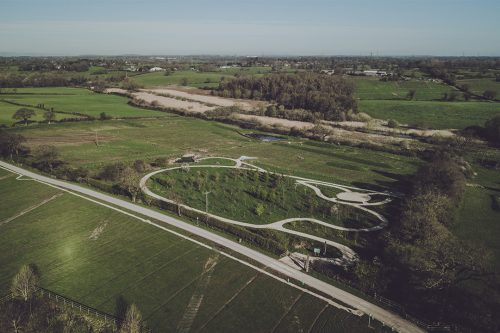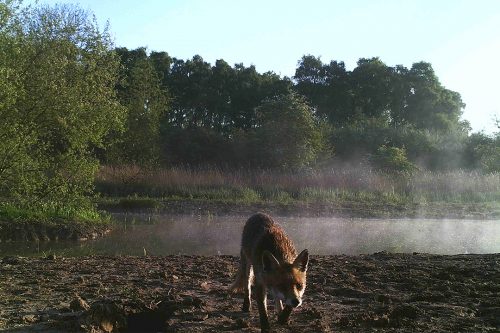The Nature Reserve site, which officially established in 2013, is already home to a wide range of incredible local and national wildlife, including kingfishers, hedgehogs and harvest mice, as well as the occasional report of other species like otters!
Part of the Nature Reserve is designated as a Local Wildlife Site for the important plants, birds and invertebrates recorded there. The new area is a 600% expansion, providing a new and larger protected habitat for vulnerable species.

PSSSTT
This area was formerly used for agriculture, but over the past two years we have been carefully restoring it to allow nature to move in and thrive. It now comprises wildflower meadows, ponds, beetle banks, log piles, trees and a reedbed, with a hide for viewing the wildlife.
Sarah Bird, Chester Zoo Biodiversity Officer
“Linking into the strip of wetland along the canal, the reserve provides a new wildlife refuge at the zoo, and creates a corridor of habitat allowing species to move through the landscape when they need to.
We hope visitors will enjoy it too – and if people are inspired to act for wildlife at home in their own gardens then even better!”
Sadly, across the UK, familiar and formerly widespread species such as water voles and the small tortoiseshell butterfly are declining sharply. They are just a fraction of the species facing extinction in the UK, which could benefit from the reserve.
Wide hedges, meadows and rough grassland at the reserve will be carefully managed to help species such as the hedgehog, which appears to be declining in the UK at the same rate as tigers are globally – at around 5% a year, in both rural and urban habitats. Around 30% of the population appears to have been lost since 2002, and it is likely that there are now fewer than a million hedgehogs left in the UK.

The new Nature Reserve meadow will help bumblebees and many other pollinating insects that are currently struggling in the UK. Half of the nation’s 27 bumblebee species are in decline, seven species have declined by more than 50% in the last 25 years, and three UK bumblebee species have already gone extinct.
Most UK bat species have seen populations fall in the last 100 years; only a few are showing signs of recovery. Populations of pipistrelles (the most common bat species) have declined dramatically in the last few decades alone, but conservationists at the zoo have already seen bats feeding over the new meadow and ponds at the reserve and have installed bat boxes in trees nearby.
The Nature Reserve will also provide a boost to British wildflowers. Wildflowers are important to healthy habitats and bring colour to the countryside. Yet one-in-five of Britain’s wildflowers is threatened with extinction in the UK and our flora is the least protected, invested in and acknowledged part of the country’s wildlife heritage.
The reserve is being officially supported and unveiled by TV presenter of Channel 4’s Wild Things, Dr Trevor Dines. He said:
PSSSTT
With over 97% of our wildflower meadows destroyed since the last world war, everything we can do to put some colour back into the countryside helps. The new meadow at Chester Zoo is a thrilling example, which contributes to a total of 2008 acres of new meadows created through HRHs Prince Charles’ Coronation Meadows project. I can’t wait to see flowers like yellow rattle, red clover and knapweed appear, providing valuable nectar and pollen to bees, butterflies and other pollinators.
Trevor Dines, TV presenter
Get closer to nature than ever before in our 2019 annual Wildlife Connections Festival.
Now in its FOURTH year, we have two jam-packed days with amazing activities that will have you enthralled by the wildlife found right on our doorstep, all set in our stunning Nature Reserve.
On Saturday evening, we would love you to join us for a fantastic opportunity for you and your family to camp with us and celebrate our nocturnal UK species.
You’ll have the chance to explore our Nature Reserve at night to see what amazing animals come out at night – like bats and moths!
NOW is the time to ACT FOR WILDLIFE. Conservation is CRITICAL; species are under threat. TOGETHER we can make a BIG difference. Take action TODAY and join us in PREVENTING EXTINCTION.